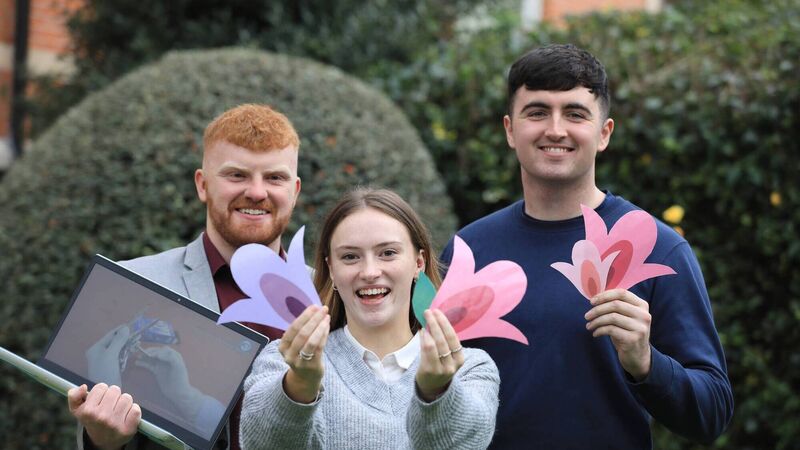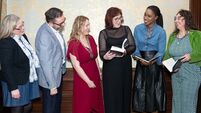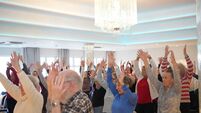Cork women: Engineering is such a diverse and viable career option

Mechanical and biomedical engineering students from MTU Cork who developed a new medical device to increase cervical cancer detection rates by making the examination process more comfortable for practitioners and patients. They were awarded the Siemens Innovative Student Engineer of the Year Award 2022 by Engineers Ireland. Pictured are students MARTHA Sean O’Shea, Mary O’Riordan and Andy Leahy.
HAVE you ever sat back and really thought about the process that goes into the items we use every day? The chairs we sit on; the pens we use; the devices we rely on?
Well, Cork’s engineers have, and they’re trying to spread the word on just how many different engineering jobs are out there in the world, from car acoustic specialists to medical innovators.
“It’s all about getting to younger people and telling them that this is a viable career option.
"You’re always going to get a job in engineering and there are so many opportunities,” says Mary O’Riordan, a final year biomedical engineering student in MTU.
Mary is part of the team behind a new medical device, Tulipa, that many believe will help change women’s healthcare. The team were awarded the Innovative Student Engineer of the Year Award last year by Engineers Ireland for creating the innovative tulip-shaped speculum, which is designed to improve comfort during vaginal exams.
The idea for developing Tulipa originally came from Mary and another of her female team members. However, Mary says that she wasn’t always drawn to engineering.

The Ovens native was originally meant to travel to Scotland to study radiography but, just minutes before she boarded her flight, she decided it wasn’t for her.
“I hadn’t a clue what I wanted to do,” she says.
“I knew the healthcare sector really interested me but I didn’t want to be anywhere near a patient.
"My sister works in engineering and told me about the biomedical side and it all clicked. It was perfect for me; it was all medical, with some physics and maths, and I didn’t need to touch a patient.
“I came from a school where women became nurses and teachers and men became engineers, so I had never thought of it before.
“There’s absolutely nothing wrong with those other jobs but I think everyone should be told that engineering is an option everyone has - it isn’t just for men.”
‘I didn’t think engineering was for girls’
According to the Society of Women Engineers, only 9% of mechanical engineers are female and women make up just 10% of electrical engineers, 18% of software engineers, and 25% of biomedical engineers.
Engineers Ireland estimates that just 12% of Irish engineers are women, even though the Higher Education Authority indicates nearly a quarter of engineering graduates are female.
Mary estimates there are only three female students of more than 60 in the final year mechanical engineering course in her college, but says that her course is actually female dominated.
“Biomedical engineering is basically mechanical engineering but there is an anatomical slant. You learn all about how to design machinery but you also learn all about the body so that you’re able to cope with a medical device machine that makes a product, like a hip implant, that will end up in someone’s body,” Mary explains.
She says that she didn’t love studying the subject in the beginning, but as soon as she went on placement in DePuy Synthes in Cork, she knew she was right not to board that plane to Scotland.
“That was it for me. I knew I loved it. It’s so much more interesting when you can see it happen in front of you as opposed to reading it in a book,” she says.
When it came to the Innovative Product Development module on her course, she was all in.
‘Innovation is the core of engineering’
The module entails developing a new product as a team and throughout the year, Mary and seven other students came up with Tulipa, a modern take on the vaginal speculum.
“You have to come with something completely novel. The speculum is in no way novel, it’s a barbaric device if you look at it through the years. Myself and Daineadh Power, who was in my group, decided enough was enough,” says Mary.
“We changed the typical bivalve speculum with two leaves into more of a tulip shape that opens in a controlled manner. It gives the patient more comfort and it also gives practitioners a better view.”
The team won MTU’s Entrepreneur of the Year award, were shortlisted for the Enterprise Ireland Awards, and there is interest in developing the product further from multiple medical device companies.
Mary says she couldn’t have imagined any of it a few years ago, and she would advise anyone thinking about a career in engineering to give it a go.
“I definitely didn’t think engineering was for me but you can do whatever you want with an engineering degree,” she says.
“Innovation is at the core of it and if you are in any way creative or like designing things, engineering is for you.”

‘Engineers are adaptable’
Someone who knows all about the options an engineering degree provides is Orla Hartley, a Programme Manager with Johnson & Johnson.
“An engineer can be many things. No two really do the same job. When I tell people I’m an engineer, they often assume that I go off to building sites but I don’t do anything like that,” she says.
Orla started out as an acoustic engineer with Jaguar Landover, having studied engineering with music in Glasgow. She spent nine years with the company working on an array of projects, later becoming a lead engineer and manager.
“I started out with the delivery of sound systems in new vehicles but your job as an engineer is always changing and evolving because it’s all to do with applying technology to solve problems.
“I ended up moving into lots of different areas like Software Over-The-Air, which has to do with sending software fixes to vehicles without them having to go to the garage.”
Orla was part of a United Nations task force for developing new legislation for over-the-air technology while with Jaguar Land Rover and she also worked in the company’s electrical department.
In 2021, the Ballinora native started working with Johnson & Johnson in Cork and now helps improve the company’s new product launches.
Orla has won countless awards for her work and is a STEPS Engineers Week Ambassador with Engineers Ireland, as well an Institution of Engineering and Technology Council Member. She often travels to schools to give talks on engineering.
“The feedback is always ‘I never knew you could do that as an engineer’,” she says.
“In ten years, I’ve probably had eight different roles on different projects. It’s such a diverse job and you can work for any company as an engineer. Engineers are very adaptable.”

Orla didn’t decide to study engineering until she was in sixth year of secondary school. Her favourite subjects were maths and music, and she eventually came across the Masters in Engineering degree in Electronics with Music at the University of Glasgow, where she was one of two women in her class.
Her current role may not have much to do with music, but she has fallen in love with yet another side of engineering through it, and believes that anyone can help change the world as an engineer.
“You feel like you’re working on something that changes people’s lives in a positive way and I think that’s a big benefit of many engineering jobs.
“From renewable energy companies to technology companies to food companies, there are so many impactful engineering jobs out there,” she says.
“One of the best ways we can tackle the biggest issues facing humanity is actually as an engineer.”
To see a video Orla was involved in to promote engineering, see https://www.borntoengineer.com/video/orla-murphy.







 App?
App?


